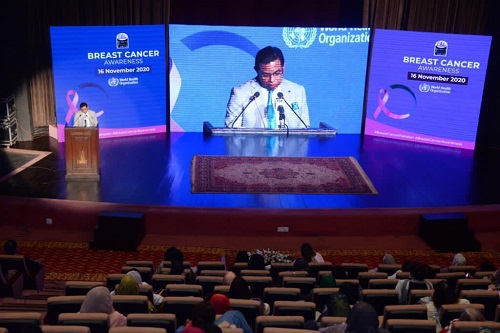
17 November 2020 – The World Health Organization (WHO), in collaboration with the Women's Parliamentary Caucus (WPC), arranged a breast cancer awareness session in Lahore on Monday. The event is part of a nationwide advocacy campaign to promote early detection of breast cancer, as 1 out of every 9 women in Pakistan are likely to be affected at some point in their lives. The real-life stories of women survivors were shared highlighting the struggles and yet ultimate triumph of overcoming this common form of cancer at the event. The First Lady of Pakistan Dr Samina Alvi, Secretary of the WPC and Member of the National Assembly of Pakistan Ms Munaza Hassan along with the WHO Representative in Pakistan Dr Palitha Mahipala addressed the attendees of the event.
WHO Representative in Pakistan, Dr Palitha Mahipala, said that “breast cancer is the second leading cause of death among women in Pakistan. It is very important that women learn to conduct self-examination and seek early medical assistance to improve the outcome of this disease”.
First Lady Samina Arif Alvi who is a strong advocate of raising awareness on breast cancer, emphasized that, “almost half of the country’s population of Pakistan comprises women, therefore, it is imperative to support them with specialized services.” The First Lady also stressed the important role of parliamentarians in highlighting of the issue of breast cancer at national and constituency levels to spread awareness.
In Pakistan, approximately 90 000 new cases of breast cancer are diagnosed annually, of which 40 000 patients lose their lives due to late detection. According to a recent study, 77% of invasive breast cancer occurred in women above 50 years of age, but if diagnosed early survival rates were 90%.
The event was followed by screening of a telefilm, featuring a breast cancer survivor to highlight the social and economic issues that women with breast cancer endure in Pakistan. The telefilm reflected upon the relationship dynamics of a female breast cancer patient with her family and addressed the stigma of breast cancer, by including male counterparts in the disclosure and how it is equally important to sensitize both men and women.
While discussing the life-threatening disease, secretary of the WPC Ms Munaza Hassan said that, “Pakistan has the highest incidence of breast cancer in Asia and ranks eighth globally in deaths caused by breast cancer. We all should work together to ensure women are aware of the risks and feel empowered to seek timely treatment.” Women are advised by health professionals to get screening mammograms done every year, after the age of 40. Moreover, if they have a family history of breast cancer or other risk factors, doctors may advise them to get them even sooner.
WHO strongly recommends women to learn self-examination in order to detect early signs of breast cancer and is fully committed to support the Ministry of National Health Services, Regulations and Coordination in Pakistan to prevent breast cancer. By promoting breast cancer control within the context of comprehensive national cancer control programmes including prevention, early detection, diagnosis and treatment, rehabilitation and palliative care many lives can be saved.







